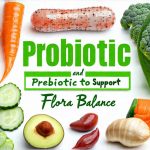A healthy gut is foundational to overall well-being, influencing everything from digestion and nutrient absorption to immune function and even mental health. For those following a vegan lifestyle, optimizing gut health requires a slightly different approach than conventional dietary advice, focusing on plant-based sources of fiber, probiotics, and prebiotics. Many assume a vegan diet is inherently gut-friendly, but simply eliminating animal products isn’t enough; thoughtful planning is key to ensure you’re providing your microbiome with everything it needs to thrive. This article will outline a comprehensive vegan gut health diet plan, offering practical tips and insights for a flourishing digestive system and improved overall vitality.
The good news is that a plant-based diet naturally lends itself well to supporting gut health. Plants are brimming with fiber – both soluble and insoluble – which acts as food for beneficial gut bacteria. However, the sheer variety of plant foods available means choosing wisely can make all the difference. This isn’t about restriction; it’s about abundance, prioritizing whole, unprocessed vegan options that promote a diverse and robust microbiome.
Building Blocks of a Vegan Gut-Healthy Diet
At its core, a gut-healthy vegan diet revolves around incorporating a wide range of plant foods. Think beyond just fruits and vegetables – legumes (beans, lentils, chickpeas), whole grains (quinoa, brown rice, oats), nuts, and seeds all play vital roles. Fermented vegan options are also incredibly beneficial, offering live probiotic cultures that directly populate the gut with helpful bacteria. Focus on variety to encourage a diverse microbiome; each type of fiber feeds different bacterial strains, leading to a more resilient and balanced system.
Minimizing processed vegan foods is equally important. Many plant-based alternatives, while convenient, can be high in sugar, oil, or artificial ingredients that disrupt gut health. Reading labels carefully and prioritizing whole food sources will ensure you’re nourishing your microbiome instead of hindering it. Hydration is also crucial; water helps move fiber through the digestive system and supports bacterial activity.
Vegan Sources of Probiotics & Prebiotics
Probiotics are live microorganisms that offer health benefits when consumed, while prebiotics are types of fiber that feed those beneficial bacteria already residing in your gut. Fortunately, several vegan foods excel at providing both. Fermented foods like sauerkraut (unpasteurized), kimchi, tempeh, miso, and certain plant-based yogurts (look for ‘live and active cultures’) offer probiotic benefits. Kombucha is another option, though be mindful of its sugar content.
Prebiotic-rich options are plentiful in a vegan diet. Onions, garlic, leeks, asparagus, bananas (slightly green), oats, barley, apples, and flaxseeds are all excellent sources. Combining prebiotic and probiotic foods creates what’s called ‘synbiotics,’ enhancing the effectiveness of both. For example, pairing fermented tempeh with a side of roasted asparagus is a powerful gut-boosting combination.
Incorporating Fiber Gradually
A sudden increase in fiber intake can actually cause digestive discomfort – bloating, gas, and cramping are common symptoms. This is because your gut bacteria need time to adapt to the new food source. Start slowly, adding small amounts of high-fiber foods to your diet gradually over several weeks. Increase your water intake simultaneously to help with digestion.
Pay attention to how your body responds and adjust accordingly. Different people tolerate different types and quantities of fiber. If you experience persistent discomfort, consider experimenting with different sources or consulting a registered dietitian specializing in plant-based nutrition. Don’t aim for an arbitrary amount of fiber; focus on feeling comfortable and regular.
Addressing Potential Deficiencies
While a well-planned vegan diet can be incredibly nourishing, it’s important to be aware of potential deficiencies that could impact gut health. Vitamin B12 is essential for nerve function and healthy digestion, and supplementation is typically necessary for vegans. Similarly, omega-3 fatty acids, particularly EPA and DHA, are often lacking in plant-based diets and may require supplementation from algal oil. Iron deficiency can also disrupt digestive processes.
Addressing these deficiencies ensures your body has the resources it needs to support optimal gut function. Regular blood tests can help identify any imbalances and guide appropriate supplementation strategies. A balanced diet supplemented where necessary is far more effective than simply focusing on fiber alone.
Long-Term Gut Health Maintenance
Maintaining a healthy vegan gut isn’t a one-time fix; it’s an ongoing lifestyle commitment. Consistent consumption of diverse plant foods, fermented options, and adequate hydration are crucial for sustaining a thriving microbiome. Stress management plays a significant role too – chronic stress can negatively impact gut health. Incorporate practices like yoga, meditation, or spending time in nature to reduce stress levels.
Listen to your body’s signals and adjust your diet as needed. Pay attention to how different foods make you feel and identify any triggers for digestive discomfort. Remember that everyone’s microbiome is unique, so what works for one person may not work for another. Prioritizing a holistic approach – encompassing diet, lifestyle, and stress management – will set you on the path to long-term gut health and overall well-being.
Ultimately, cultivating a healthy vegan gut requires knowledge, consistency, and self-awareness. It’s about embracing the abundance of plant foods while being mindful of potential deficiencies and prioritizing practices that support both your physical and mental health. A flourishing microbiome is not just about digestion; it’s about building a foundation for lasting vitality and well-being.


















